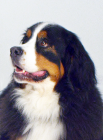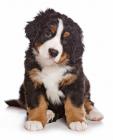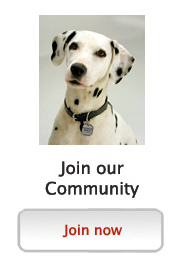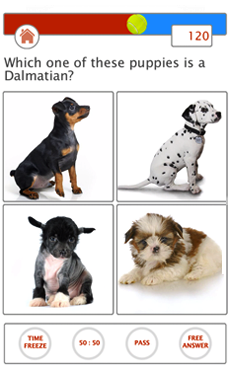Bernese Mountain Dog
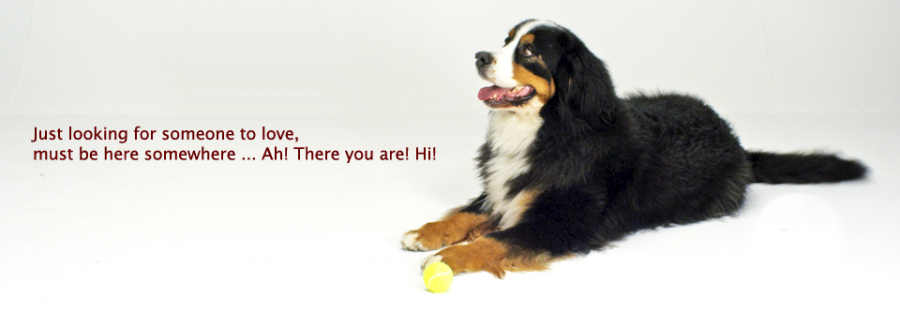
In my own words
Hello, Bonjour, Guten Tag, Ciao – we Swiss can speak Dog in four languages you know. But we have one universal language too - Love. Take me for example (please?) I just love everybody! All I want to do is hang out with you and put my chin on your knee, though I can do lots of other things too, ‘cos I get a bit portly if I don’t get my exercise. One of my favourite games is pulling the children around in a little cart or a sledge in winter – I’m quite strong. I’m not a great one for anything that involves being athletic though – too heavy, but I’m quite fast after a ball. Just don’t expect me to rush around too much on a hot day, not in this coat!
My ideal owner(s)
Families
Singles
Outdoorsy people
What they say about me
Cuddly softie
Gentle
Loyal
Laid back
Great with children
Please read on, to find out more about me, and whether I will be someone you can be happy with for the next 10 years.
Is this Bernese Mountain Dog for you?
Test your knowledge about the Bernese Mountain Dog
Information essential about the Bernese Mountain Dog
Kennel Club Group:
Working
Size: Large. Height Male 25 – 27 ½“ (64 – 70 cm) Female 23 – 26” (58 – 66 cm). There is no weight average recorded with the Kennel Club, but you can expect your Berner to weigh between 88 and 120 lb (40 – 55 kg).
Popularity:
The Bernese is popular in the UK and the US as the perfect family dog.
Breed History:
The Bernese Mountain Dog gets his name from the Swiss canton of Bern and is one of four standard Swiss Mountain Dogs, but has a longer, smoother coat than the other three. The world “sennenhund” is derived from his environment. Senne are alpine pastures, and the Senn were the herdsman and dairymen who used this breed in their work. Indeed, Berners have been working dogs for hundreds of years, possibly from Roman times, guarding farms, protecting cattle and doing light draught work. They were first established as a breed in 1907 and became popular at pets in Europe and the US in the mid 1920’s. They became members of the Kennel Club in 1937 in the Working Group.
Character:
Your Berner is basically an outdoorsy person, though he will be well behaved in the house. He needs a lot of exercise to keep slim, but he lacks endurance, so he will make a better walking companion than someone to take running with you. However, as long as he is sound he will love a hike, and will stay close by you and not stray. Berners do not respond well to harsh training methods – praise and treats work a treat! He will get on well with your other pets, including cats, and even horses. Slow to mature, your Berner will show quite puppyish behaviour until he is as old as 2 ½ , so start his training and socialisation early on.
Temperament:
Your Berner is affectionate and loving, reliable and dependable, and very intelligent. He is also loyal and faithful to the point that if he loses his home and has to go to another family it can take a long time for his to settle in. Your Berner can tend towards shyness, though once he gets to know people, he will be soft and friendly with them. Aggression is rare in the Berner, but very exact standards of breeding are not always upheld, so do be careful to buy only from a reputable source.
Conformation:
Your Bernese Mountain Dog should look large, sturdy and imposing with a tri-coloured coat. The head should be broad, with a well defined stop, a long, straight muzzle with defined lips and smallish V shaped ears, softly drooping. The medium set eyes should be almond shaped and dark brown. The strong, well muscled neck should lead to a compact body with a broad chest, strong loins with a rounded rump. The hindquarters should be strong with well bent stifles, well let down hocks which are parallel when viewed from behind. His feet should be short and round, and his bushy tail should reach to just below the hocks.
Colour:
In the showing world, the pattern of the coat is important, basically black, with a white chest, and rust coloured “eyebrows” above the eyes, along the sides of the mouth, the fronts of the legs and a rusty fringe around the white chest. Ideally, he should have a white “horse shoe” around the nose and a white “Swiss Cross” on his chest when looked at from the front. A “Swiss Kiss” can often be seen as a white patch just behind or on the neck.
Training:
Your Berner will take easily to his training, provided it is done positively with lots of praise and rewards. As a youngster, he may be quite boisterous, so start early with training and socialisation, especially if he will be mixing with other dogs and especially horses when young.
Care:
Your Berner’s coat maybe rough in outline, but it is silky soft to touch with a fairly dense undercoat. It is pretty resistant to dirt and wet, so a good brush every week or two should suffice, unless he is in moult. Your Berner will shed all the year round, but every so often he will “blow” his undercoat at which time a few good groomings with a drag comb (looks like a small rake) will help him get rid of it all.
Health:
Your Berner is a very large dog, and as such has a relatively short lifespan, averaging only eight to ten years against an average of 10 to 11 years in other dogs of this size, including purebreds. In a 2004 survey done in the UK of 394 Berners which died that year, only one survived until the age of 15. The main cause of death in Berners is cancer, and other problems include arthritis, hip dysplasia, where the patella, or kneecap dislocates and re-locates itself, and cruciate ligament rupture. The cruciate ligament runs over the point of the hock and can easily slip off. Onset of these problems can occur as young as four or five. The answer is to keep your Berner as fit as you can without overworking him. Jumping and running in small circles should be avoided whenever possible, as these movements put a lot of strain on the joints. As with any dog, it is vital to ensure that you buy from a reputable breeder. When all is said and done, although your Berner may not make it to his teens, he will more than make up for this by the love and companionship he will bring you in his lifetime.
You may also like:
If you like Bernese Mountain Dogs, you may be interested in breeds of the same size »
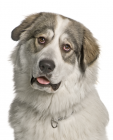
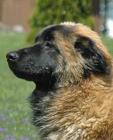
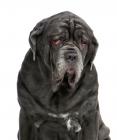
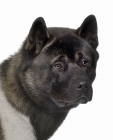
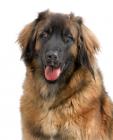
If you like Bernese Mountain Dogs, you may like other breeds with similar characteristics »
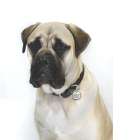
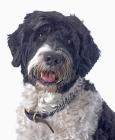

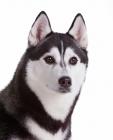
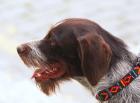
If you like Bernese Mountain Dogs, you may be interested in these other working dogs »
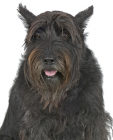

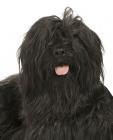
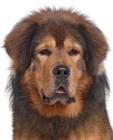

Advice on choosing your breed »
Find an animal shelter or rescue home where a Bernese Mountain Dog is waiting for a new home »
The following grid gives a fast track review which covers all breeds. You can apply it to help you decide if a Berner is suitable for you, the environment where you live, your personality and your lifestyle. On the grid, 1= strongly disagree, and 5= strongly agree. For example, if you are looking for a dog that like to go walkies, look down the list under Activities, and you will see that Berners make great walking companions, scoring 5. If you want a dog that is good with children, look under Role & Suitability, and you will see that Berners are just that, and score 5. You might like to save or print off this section and keep it for reference while you check some other breeds before making your final choice.
Be the first to rate this breed »
|
*PLEASE NOTE: All our breed profiles are general, and all dogs are individuals. Always talk to the breeders and meet the owners you are buying from. Try to meet the dog and its parents if it is a puppy in their home environment.








